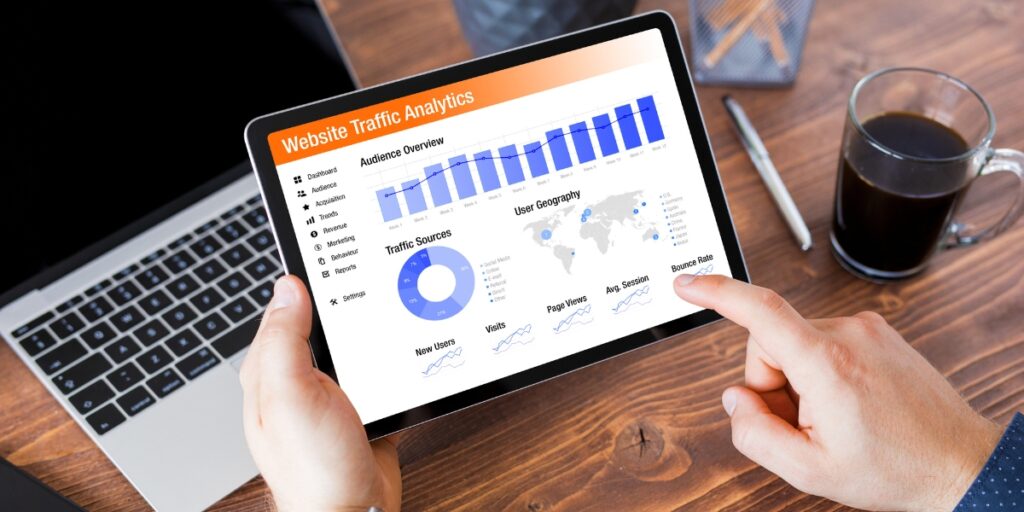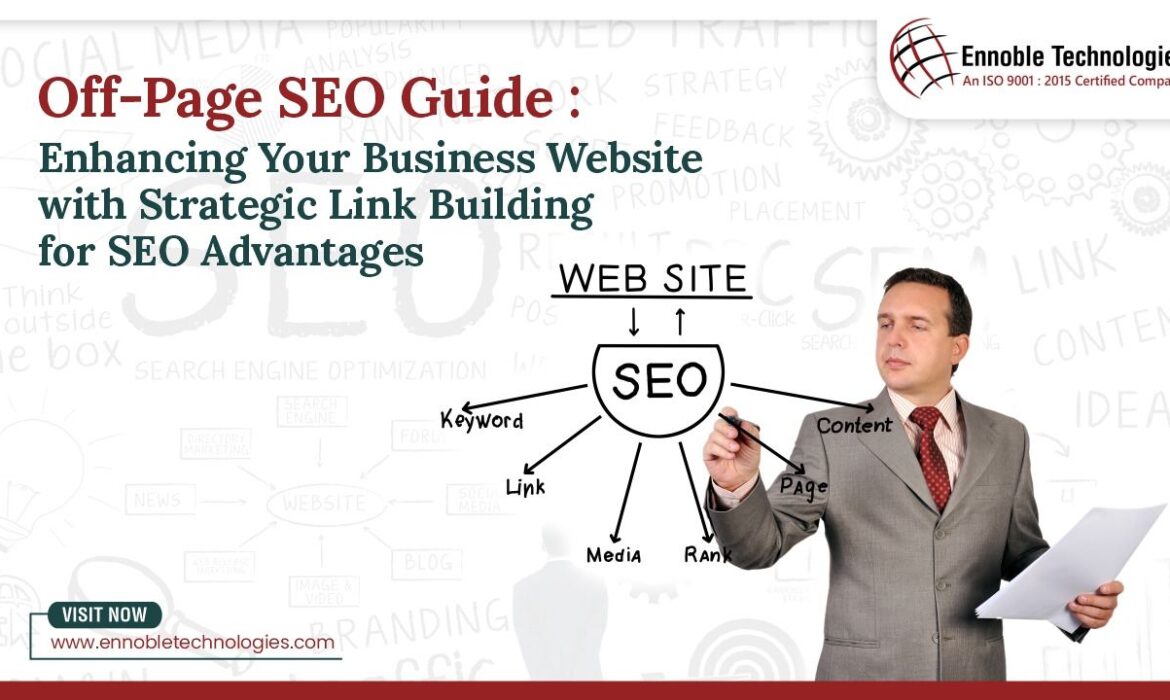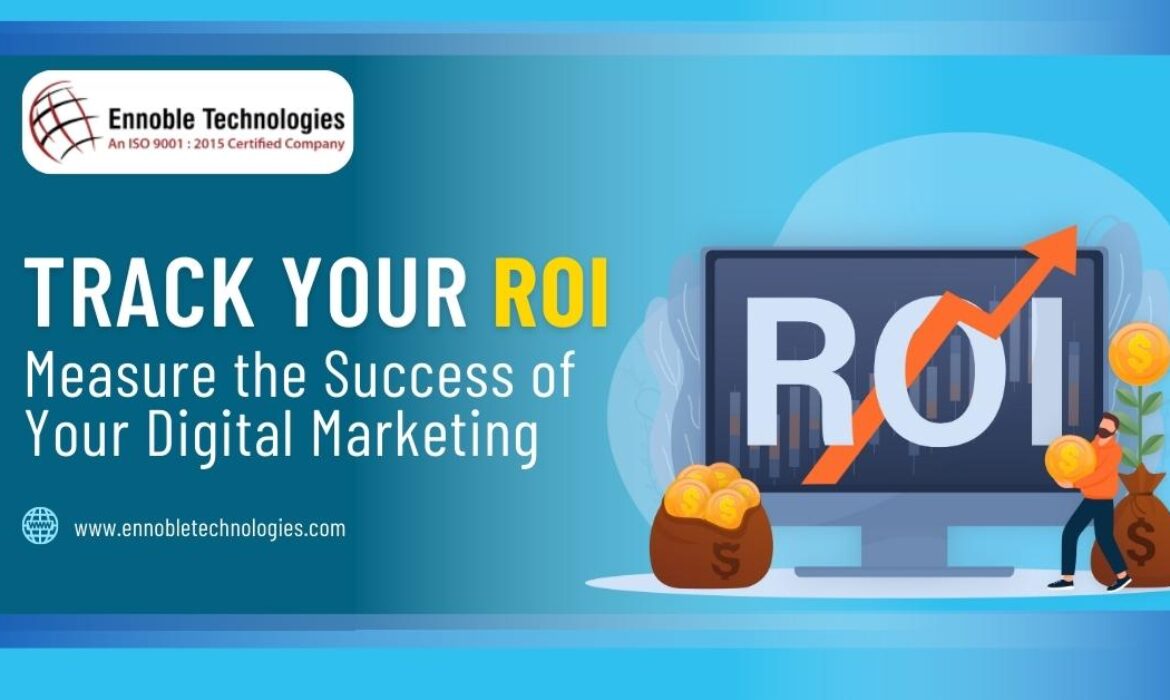Off-Page SEO Guide: Enhancing Your Business Website with Strategic Link Building for SEO Advantages
Introduction
In the world of digital marketing, Off-Page SEO plays a critical role in enhancing the visibility and ranking of websites on search engine results pages (SERPs). It focuses on optimizing factors outside the website itself, such as link building and online reputation management. Let’s delve deeper into the realm of Off-Page SEO and discover how strategic link building and other techniques can significantly impact your business’s online presence.
Understanding Off-Page SEO : A Beginner’s Guide
What is Off-Page SEO?
Off-Page SEO refers to optimization efforts that occur outside the boundaries of a website. It involves activities aimed at improving the website’s authority, relevance, and trustworthiness in the eyes of search engines. These efforts are crucial because search engines like Google consider external factors to determine a website’s credibility and rank it accordingly on SERPs.
One of the primary goals of Off-Page SEO is to acquire high-quality backlinks from reputable websites. These backlinks act as votes of confidence for your site, signaling to search engines that other sites trust your content enough to link back to it. As a result, your website’s authority and visibility increase, leading to higher rankings and organic traffic.
Importance of Off-Page SEO:
Off-Page SEO plays a pivotal role in enhancing your website’s visibility and authority on search engines. It focuses on external factors like backlinks, social signals, and brand mentions that contribute to your site’s overall reputation. By implementing effective Off-Page SEO strategies, you can improve your search engine rankings, attract organic traffic, and boost brand credibility.
Difference Between On-Page and Off-Page SEO:
On-Page SEO involves optimizing individual web pages for search engines by optimizing content, meta tags, and internal linking. In contrast, Off-Page SEO focuses on external factors such as backlinks, social media engagement, and online reputation management. While On-Page SEO is about optimizing the structure and content of your website, Off-Page SEO aims to increase your site’s authority and trustworthiness through external signals.
Types of Off-Page SEO Techniques:
a. Link Building: Acquiring quality backlinks from authoritative websites is a fundamental Off-Page SEO technique.
b. Social Media Engagement: Actively engaging with your audience on social media platforms can boost brand visibility and generate social signals.
c. Content Marketing: Creating valuable and shareable content like infographics, videos, and blog posts can attract natural backlinks.
d. Influencer Outreach: Collaborating with influencers can expand your reach and attract relevant traffic to your site.
e. Local SEO: Optimizing your online presence for local searches through local directories and Google My Business is crucial for local businesses.
Importance of Backlinks in SEO: Basics and Benefits
Backlinks are incoming hyperlinks from one webpage to another. They are a fundamental aspect of Off-Page SEO and hold significant weight in search engine algorithms. Search engines view backlinks as endorsements or votes of confidence for a website’s content. The more high-quality backlinks a site has, the more authority and credibility it gains in the eyes of search engines.
There are two main types of backlinks: Dofollow and Nofollow. Dofollow links pass link equity and contribute to a website’s SEO rankings. On the other hand, Nofollow links do not pass link equity but can still drive traffic and improve brand visibility.
Quality backlinks offer several benefits for SEO, including improved search engine rankings, increased organic traffic, enhanced online visibility, and greater trust and authority. However, it’s essential to focus on acquiring natural and relevant backlinks from authoritative sources to maximize these benefits.
Anchor Text Optimization: Beginner to Advanced Techniques
Anchor text plays a crucial role in Off-Page SEO, as it provides context and relevance to the linked content. Optimizing anchor text involves using relevant keywords or phrases that accurately describe the linked page’s content. This optimization helps search engines understand the content’s topic and improves the linked page’s ranking for those keywords.
Beginners can start by using descriptive anchor text that clearly indicates what the linked page is about. As you advance, consider using variations of anchor text, including exact match, partial match, branded, and generic anchor text. Diversifying anchor text types and incorporating long-tail keywords can enhance link relevance and improve SEO performance.
Directory Submissions Demystified: Step-by-Step Guide
Directory submissions are a common Off-Page SEO technique used to improve website visibility and generate backlinks. Directories are online platforms that categorize and list websites based on their niche or industry. Submitting your website to relevant directories can enhance its online presence and attract potential visitors and customers.
To submit your website to directories effectively, follow these steps:
- Research and identify reputable directories in your industry.
- Ensure your website meets the directory’s submission guidelines.
- Create a compelling and informative listing for your website.
- Submit your website to the selected directories, providing accurate and up-to-date information.
- Regularly monitor and update your directory listings to maintain accuracy and relevance.
By following this step-by-step guide, you can leverage directory submissions to boost your website’s visibility and attract valuable traffic.
Unlocking Off-Page SEO: Mastering Strategic Link Building for Business Growth

In today’s competitive digital landscape, Off-Page SEO plays a pivotal role in enhancing your website’s visibility and driving organic traffic. As businesses strive to optimize their online presence, understanding the nuances of Off-Page SEO becomes imperative. In this comprehensive guide, we delve into key Off-Page SEO strategies, including guest blogging, social bookmarking, harnessing social signals, influencer marketing, and PR outreach.
Guest Blogging Essentials: How to Get Started
Guest blogging is a powerful Off-Page SEO technique that not only helps in acquiring backlinks but also establishes your authority in your industry. By contributing valuable content to reputable websites, you can reach a wider audience and drive targeted traffic to your site. Here’s how to kickstart your guest blogging journey.
Introduction to Guest Blogging and its Benefits for SEO
Guest blogging involves writing and publishing content on other websites as a guest contributor. It offers several benefits for SEO, including building backlinks, increasing brand exposure, and improving search engine rankings.
How to Find Guest Blogging Opportunities in Your Niche
Start by researching websites in your niche that accept guest posts. Use search engines and social media platforms to identify potential opportunities. Look for websites with a strong domain authority and engaged audience.
Tips for Writing a Successful Guest Blog Post and Outreach Strategies
When crafting your guest blog post, focus on providing valuable, informative content that resonates with the target audience of the hosting site. Personalize your outreach emails to site owners, highlighting the value you can offer through your guest post.
Social Bookmarking Strategies: Tips for Success
Social bookmarking is another effective Off-Page SEO strategy that involves bookmarking your website or content on social bookmarking platforms. Here’s how to leverage social bookmarking for SEO benefits.
Explanation of Social Bookmarking and its Relevance in SEO
Social bookmarking platforms allow users to save, organize, and share web pages. These platforms have high domain authority, making them ideal for creating backlinks and improving website visibility.
Benefits of Social Bookmarking for Improving Website Visibility
Social bookmarking helps in generating backlinks, driving referral traffic, and increasing online visibility. It also enhances your website’s authority and credibility in the eyes of search engines.
Tips and Strategies for Effective Social Bookmarking
Choose relevant and popular social bookmarking platforms to share your content. Optimize your bookmarks with catchy titles, descriptions, and relevant keywords. Engage with other users’ bookmarks and participate in relevant communities to maximize your reach.
Harnessing Social Signals for SEO: Beginner’s Overview

Social signals refer to the metrics related to social media engagement, such as likes, shares, comments, and social media mentions. These signals can influence search engine rankings and online visibility. Here’s how to harness social signals for SEO success:
Understanding Social Signals and their Impact on Search Rankings
Social signals indicate the popularity and relevance of your content on social media platforms. Search engines consider social signals as a measure of user engagement and content quality, which can impact search rankings.
Importance of Social Signals in SEO and How They are Measured
Social signals contribute to building brand authority, driving traffic, and improving search engine visibility. Metrics like social shares, likes, comments, and follower growth are used to measure social signals’ effectiveness.
Strategies to Increase Social Signals and Monitor their Effectiveness
Create shareable and engaging content that encourages social media interactions. Use social media analytics tools to track social signals and monitor the performance of your social media campaigns. Encourage audience participation and interaction to boost social signals.
Influencer Marketing for Link Building: Getting Started Guide
Influencer marketing involves collaborating with influential individuals in your industry to promote your brand, products, or services. This strategy not only helps in building backlinks but also expands your reach and credibility. Here’s how to leverage influencer marketing for link building.
Introduction to Influencer Marketing and its Benefits for SEO
Influencer marketing allows you to tap into the existing audience of influencers and leverage their authority and credibility to promote your brand. It can result in quality backlinks, increased brand awareness, and improved search engine rankings.
How to Find and Engage with Influencers in Your Industry
Identify relevant influencers in your niche using social media platforms, influencer marketing tools, and industry directories. Build relationships with influencers by engaging with their content, offering value, and showcasing mutual benefits.
Collaborating with Influencers for Link Building and Measuring ROI
Collaborate with influencers on content creation, guest blogging, product reviews, or sponsored campaigns that include backlinks to your website. Track the performance of influencer collaborations using metrics like referral traffic, backlinks, conversions, and ROI.
PR Outreach and Press Releases: Best Practices
PR outreach and press releases are traditional yet effective Off-Page SEO tactics for gaining media coverage, building brand authority, and acquiring backlinks from reputable sources. Here’s how to execute PR outreach and press releases strategically:
Importance of PR Outreach in SEO
PR outreach helps in creating brand buzz, securing media coverage, and earning high-quality backlinks from authoritative sources. It enhances brand visibility, credibility, and trust among target audiences and search engines.
How to Write an Effective Press Release for Maximum Impact
Craft compelling press releases that are newsworthy, timely, and relevant to your target audience. Include relevant keywords, quotes, multimedia elements, and a strong call-to-action (CTA). Distribute press releases to reputable media outlets, journalists, and industry influencers.
Strategies for PR Outreach and Leveraging Press Releases for Link Building
Build relationships with journalists, bloggers, and media professionals through personalized outreach. Offer exclusive content, insights, or interviews to attract media attention. Monitor press coverage, track backlinks, and measure the impact of PR campaigns on SEO performance.
By implementing these Off-Page SEO strategies effectively, businesses can enhance their online visibility, improve search engine rankings, and drive organic traffic to their websites. Incorporate these actionable tips and best practices into your digital marketing efforts to optimize Off-Page SEO and achieve long-term success in the digital landscape.
Forum Engagement for SEO: Tips and Tricks
Engaging in forums can significantly boost your off-page SEO efforts. By actively participating in relevant forums within your industry, you can enhance your brand visibility and establish authority in your niche.
When choosing forums to engage with, prioritize those that are highly relevant to your business. Look for active communities where discussions align with your expertise and target audience.
To make the most out of forum engagement, focus on providing valuable insights and solutions to discussions. Avoid spammy or promotional posts, as these can harm your reputation and credibility.
Building rapport with other forum members is key. Respond to queries, share your knowledge, and engage in meaningful conversations to showcase your expertise.
By consistently contributing valuable content and engaging with others, you can gradually build a positive reputation and attract organic traffic to your website through forum links.
Creating Link-Worthy Infographics: Basics for Beginners

Infographics are powerful tools for link building and content marketing. They combine visual appeal with informational content, making them highly shareable and link-worthy.
When designing infographics, focus on topics that resonate with your target audience and address common pain points or interests. Use compelling visuals, statistics, and key takeaways to make your infographic informative and engaging.
To attract backlinks, consider outreach strategies such as sharing your infographic with industry influencers, bloggers, and websites that publish relevant content. Provide them with a brief summary and encourage them to link back to your infographic when they use it in their content.
Promote your infographics across social media platforms, email newsletters, and other channels to maximize exposure. Encourage sharing and make it easy for others to embed your infographic on their websites.
By creating link-worthy infographics and promoting them effectively, you can earn valuable backlinks, improve your website’s online visibility, and enhance your SEO efforts.
Building Natural Links through Relationships: Strategies for Success
Building strong relationships is essential for acquiring natural backlinks and enhancing SEO performance. Start by identifying key influencers, bloggers, and industry experts within your niche.
Networking events, conferences, and online communities are great places to connect with potential link partners. Engage with them genuinely, offer value, and show interest in their work to build meaningful relationships.
Collaborate on content projects, guest blog posts, or joint ventures to create mutually beneficial opportunities for link building. By leveraging each other’s audiences and expertise, you can attract natural backlinks and improve your search engine rankings.
Maintain regular communication with your link partners and continue to nurture relationships over time. Monitor link placements, track performance metrics, and adapt your strategies based on data insights to optimize your off-page SEO efforts.
Competitor Backlink Analysis: Tools and Insights
Analyzing your competitors’ backlinks can provide valuable insights for enhancing your own link building strategy. Start by identifying your main competitors and using SEO tools to analyze their backlink profiles.
Look for patterns in their backlink sources, anchor text usage, and link quality. Identify high-authority websites that link to your competitors, and explore opportunities to acquire similar backlinks for your site.
Utilize backlink analysis tools to assess the authority and relevance of competitor backlinks. Focus on acquiring backlinks from reputable websites within your industry to improve your own search engine rankings.
Extract insights from competitor backlinks to identify gaps and opportunities in your link building strategy. Tailor your outreach efforts, content creation, and promotional tactics based on competitive analysis to stay ahead in SEO.
Essential Off-Page SEO Tools: Must-Have Resources
Using the right tools is crucial for optimizing your off-page SEO efforts. Top off-page SEO tools offer a range of features for link building, keyword research, backlink analysis, and performance tracking.
Invest in tools that provide comprehensive link building insights, such as backlink quality assessment, competitor analysis, and link tracking capabilities. These tools help you identify link opportunities, monitor progress, and optimize your off-page SEO strategy.
Keyword research tools are essential for identifying relevant keywords, analyzing search volume, and uncovering SEO opportunities. Use backlink analysis tools to assess your backlink profile, track new links, and monitor link quality over time.
Reporting and analytics tools are critical for measuring off-page SEO success. Track key performance indicators (KPIs) like backlink growth, referral traffic, social signals, and conversion rates to evaluate the effectiveness of your SEO efforts.
Measuring Off-Page SEO Success: Key Metrics to Track
To measure the success of your off-page SEO efforts, track key metrics that reflect link building, social signals, and online visibility. These metrics provide valuable insights into your SEO performance and areas for improvement.
Key performance indicators (KPIs) for off-page SEO include:
- Backlink Quality: Monitor the quality and relevance of your backlinks, focusing on authoritative and diverse link sources.
- Social Signals: Track engagement metrics like likes, shares, comments, and mentions on social media platforms to gauge audience interaction.
- Referral Traffic: Analyze traffic from external sources to measure the impact of link building efforts on website visits.
- Conversion Rates: Measure the percentage of visitors who complete desired actions, such as signing up for newsletters or making purchases.
Using data-driven insights from these metrics, optimize your off-page SEO strategies for improved search engine rankings and online visibility.
On a final note:
Mastering off-page SEO is essential for enhancing your website’s rankings, driving organic traffic, and improving online visibility. By implementing strategic link building, leveraging digital marketing techniques, and monitoring key metrics, you can achieve SEO advantages and business growth. Follow the strategies discussed in the guide to boost your off-page SEO results and achieve online visibility optimization.
Read more: https://ennoblegrp.com/seo/mobile-optimization-for-on-page-seo/
Track Your ROI: Measure the Success of Your Digital Marketing
It is essential to understand how to measure digital marketing ROI accurately to check the effectiveness of your digital marketing efforts. Active monitoring is crucial in today’s digital landscape, where businesses invest many resources to increase audience reach. Or there’s no way one can guarantee their efforts and time will be fruitful. Optimizing your strategies for better results requires real-time data, which can be gained through tracking ROI. Explore the importance of ROI and various methods to determine the success of your digital marketing.
Why is tracking ROI so Important?

Tracking digital marketing ROI provides insights that are valuable in several ways. They help determine the effectiveness of your campaigns. Here are a few reasons why tracking ROI is essential:
Cost optimization: With ROI results, you can find areas where costs can be optimized. One can ensure their marketing budget is spent properly and efficiently only on the essential areas. This allows them to use the resources to create campaigns that deliver the best return without struggling much.
Informed decision: By measuring, you can gather data to help make better, data-based decisions. It becomes easy to know which marketing methods will provide the highest returns. Moreover, you can favorably use your budget.
Performance: It shows directly and clearly whether your marketing techniques are working. It lets you know if your previous actions have successfully generated satisfactory returns and met your business goals.
Measure the Success of Your Digital Marketing

Here are some ways to measure the success of your digital marketing:
Cost per Acquisition (CPA)
CPA is used for calculating the average cost required to get a customer. For instance, many would claim to be Hyderabad’s Best Digital Marketing Services. However, using this CPA method, you can quickly check if they can offer the best services at a competitive rate. With the CPA, you can decide if their campaigns have been cost-effective.
Website Traffic
The number of visitors you get to your website over a specific period can tell many things. To assess how effective one’s digital marketing methods have been, calculating the total number of visitors can significantly help. Analyze trends, and check bounce rates and referral sources as well.
Use Analytics Tools

Tools like web analytics, tracking codes, and attribution models are essential for measuring digital marketing success. They help collect valuable data on website traffic and user behavior. You can find all the answers you have been looking for using tools like Google Analytics on your website.
Conversion Rates
How many visitors purchased or used your products? The percentage of people who did take any action, such as buying your services, filling out a form, or subscribing to your newsletters Conversion rates, whether high or low, indicate your efforts and techniques’ efficiency. Also, would they need to change or continue to work?
Social Media Engagement
Monitor the engagement rate on your company’s social media. The number of likes, comments, shares, mentions, or referrals you receive over a specific period Higher engagement rates suggest your audience has increased and found the shared content helpful. Lower engagement rates could mean you still need to make improvements.
Check Return on Ad Spend
Return on ad spend, or ROAS, is another helpful method. If the revenue generated for the money spent on advertising campaigns is higher, you’ve made a good decision. However, if your ROAS is low, your campaigns have failed to perform well.
Email Marketing Metrics
Assessing the performance of your email marketing strategies is as important as checking other areas. Metrics such as open rates, click-through rates, and conversation rates provide information about the effectiveness of your email communications.
Search Engine Rankings
Track your website’s ranking on search engine results pages (SERPs) for targeted keywords. Let’s say you are offering Digital Marketing Services in Hyderabad. However, customers won’t be able to reach you unless your pages are designed and ranked for those specific keywords. The higher one’s website ranks, the more visibility and organic traffic it gets.
Conclusion
Tracking return on investment (ROI) is vital to measuring success in the digital marketing industry. It wouldn’t be enough unless you actively measured the performance and analyzed the data correctly. With limited resources and time, achieving better returns on your investments is possible. However, it’s not a one-time process. For long-term success, it requires continuous monitoring and making accurate decisions based on data, not instincts.
Ennoble Technologies, a trusted digital marketing agency in Hyderabad, stands out as a beacon of excellence in the ever-evolving digital landscape. With a relentless commitment to delivering remarkable results, Ennoble Technologies has carved a niche for itself as a reliable partner for businesses seeking to enhance their online presence and achieve remarkable growth. Their team of skilled professionals brings a wealth of expertise in various digital marketing domains, including search engine optimization (SEO), pay-per-click (PPC) advertising, social media marketing, and content strategy. By harnessing the power of data-driven insights and innovative strategies, Ennoble Technologies empowers businesses to reach their target audience effectively, drive meaningful engagement, and generate measurable success. With their unwavering dedication to client satisfaction and a proven track record of delivering exceptional results, Ennoble Technologies continues to elevate businesses to new heights in the digital realm.
Also Read: Social Media Marketing: Connect, Engage, and Grow – Ennoble Technologies
What are the benefits of link building for SEO?
Despite its simplicity, link building is a crucial part of SEO. The procedure can be challenging at times. The goal is to lure other websites to link back to yours. The site’s popularity and authority in the desired search engines are prerequisites for realizing this goal.
Google also considers user engagement when determining page rank. So merely a person clicking and exiting won’t do. The time spent on a website also is recorded in the search engine logs, which are also used to determine the genuineness of the website. So, the more visitors who visit your site, the better.
Clearly, there are many upsides to link building, and in this blog post, we will explore them all so you can get a firm grasp on the topic’s genuine importance for search engine optimization.
Improved Search Engine Rankings
One of the most important factors that search engines employ to determine a page’s ranking is the number and quality of inbound links from other similarly high-quality and reputable websites. Search engines place more stock in a website as an authoritative and relevant source of information if it has received links from other credible websites.
One factor determining where a website appears in search engine results is Google’s PageRank algorithm. When establishing a page’s worth and relevance, PageRank considers both the number and quality of inbound connections.
Research shows that websites with more backlinks have a better chance of ranking higher in SERPs. For example, according to a Moz study, websites with high domain authority and high-quality backlinks score higher in search results than those with low and low-quality ones. Remember, it’s not always about the quantity; the quality also matters. Having genuine, qualitative, trustworthy content on your website will help you stay on top in the search results.
A search engine, “Google,” “Yahoo,” or “Bing,” anything for that matter, wants to render the best service of information to the internet users. They want to avoid risking it by showing bad quality websites with wrong info on top, and they very well would appreciate a website with genuine content that they can showcase.
Increased Website Traffic
Creating inbound links to your website has significantly enhanced visitor numbers. Referral traffic, or visitors that come to your site from another, increases when other websites link to you. Referral traffic consists of users that landed on your site after clicking a link posted on another website.
The number of people visiting your site from a link on another site can rise, and the chances that your site will appear in search engine results can also increase.
As mentioned, your website’s search engine rankings will improve with more backlinks from high-quality sites. As a result, you may see increased natural search engine traffic.
Enhanced Brand Authority
Strategic link development can enhance a website’s reputation and authority. You earn authority and credibility as a resource in your industry when other trustworthy websites connect to yours.
Search engines give it greater weight if other, more established sites link to your website. This may raise your website’s search engine positioning and enhance visitors.
Also, obtaining backlinks from trustworthy websites will assist in promoting your company and raising its position online. The more your link appears on other websites, the more authority they will attribute to you as a subject matter expert.
Improved Indexing and Crawling
Building backlinks to your site can help improve search engine indexing by alerting spiders to new information on your site.
A search engine scans a website by following links from one page to another. Many backlinks from reputable sources increase the likelihood that search engine spiders will discover your website’s new pages.
Search engines can index your site’s pages better if you provide relevant connections across the area. If you do this, search engines will more likely display your site’s pages prominently. Search engines will know that a page is worthy of indexing if linked to another website.
Conclusion
To wrap it all up, link building is an important step to be implemented for any successful SEO strategy. With that in place, your website will have better search engine rankings, increase website traffic, enhance brand authority, and improve indexing and crawling of website pages on search engines.
By getting backlinks from genuine websites and authoritative sources, you indirectly leave a clue for search engines to believe your website is trustworthy. Remember, the goal is to establish an image of the algorithms so that people can read your website and get truthful information without any misleads.
So, start implementing link building today and see the positive impact it can have on your website’s search engine rankings and overall online presence.
Also Read: SEO or PPC: Top Trends for 2023 in Local Search – Ennoble Technologies






